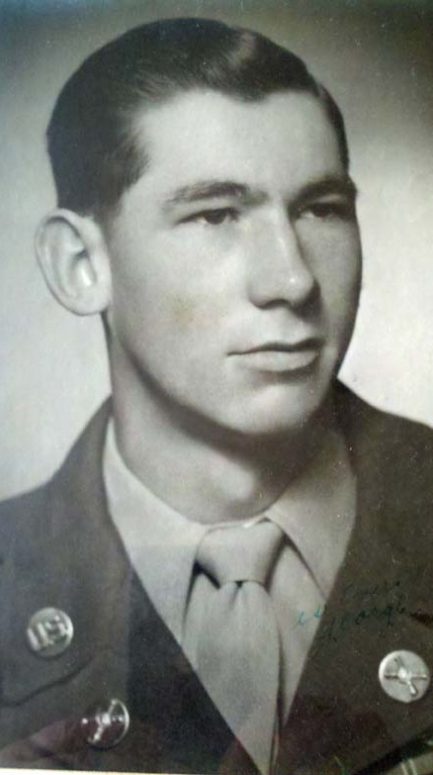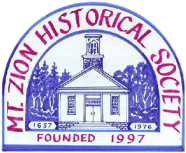Remembering
Sergeant First Class George Thomas Stroup (1925 - 2010)


US Army, WWII, Korea, Purple Heart, Bronze Star

Remembering - Sergeant First Class George Thomas Stroup by Wendy (Stroup) Marano
George T Stroup, 85, Weedville, died Saturday (Nov. 6, 2010) in New Jersey.
Born January 3, 1925 in Greenville, he was the son of the late Joseph and Mabel Patterson Stroup. He was married to Jane Rhine Stroup. She preceded him in death.
He had been a sergeant in the US Army during World War 2 and the Korea War. He was awarded the Purple Heart, the oakleaf cluster, and the Bronze Star.
He was a graduate of the Greenville High School, and attended Milwaukee School of Engineering. He retired as an engineer from Goodyear Aerospace, Akron, Ohio.
He was a member and past officer of the American Legion Post 978 Weedville, a member of the Penfield Firemen’s, Bennett’s Valley Senior Center, Kersey Eagles Club H, Maple Shade Veterans of Foreign Wars Post 2445 in New Jersey.
He is survived by a daughter, Wendy (Domenic) Marano, Maple Shade, NJ, a sister, Laura T. Stroup, Newport Beach, Calif, three grandchildren and several nieces and nephews.
He is preceded in death by a son, Chris T. Stroup and 14 brothers and sisters.
Burial was in the Arlington National Cemetery, Virginia.
Recently, I was asked by a colleague at work if I had enjoyed the Memorial Day holiday. As we casually discussed what activities our respective families had enjoyed for the long weekend, my coworker pointedly asked, “But did you do anything else with your kids to mark the holiday other than to just celebrate the unofficial start of the summer season?”
“As a matter of fact, Memorial Day is very special to my family,” I said. I proceeded to tell the coworker that for many years our family would travel from small cemetery to small cemetery all over western Pennsylvania to honor and remember long-gone family members, both military and non-military alike, and recognize the contributions they made to our family and our country.
I also explained that my father was a veteran of World War II and the Korean Conflict. For this reason, Memorial Day was also special. Military service was very common in our extended family. In addition to my dad, several of my uncles, cousins and other relatives have or are currently serving in various branches of the military including the Army, Navy, Air Force and Coast Guard.
Today (May 2010) my father, at age 85, is enjoying his time in sunny Southern California with family, having moved in the past year from our homestead on Mt. Zion, (Weedville) Elk County, Pa. Although his health had declined somewhat over the past few years, he still talks about his war experiences. Every day we lose more and more of our World War II veterans. It saddens me to think how quickly memories of a time and place are gone.
That is why it is my responsibility and the responsibility of other families to keep the stories alive and to remember the noble service of our veterans. That is why I am telling the story of my father, while he is still here so I can ask the questions and accurately carry his legacy for future generations.
This is the story of my father, George Thomas Stroup.
My dad was roughly the middle child of large family from Western, Pennsylvania. Born on January 3, 1925, he one of 14 children born to Joseph and Mabel Patterson Stroup in Greenville, Mercer County. The family, like many through the depression years, struggled to get by. As the children grew older, many of them took jobs as hired help with local farmers to help make ends meet. During our many Memorial Day “cemetery” tours, my father would point out old mill ponds where he had skated during winters as a boy and the locations or remains of one-room school houses he had attended. He is quite proud of the fact that he graduated second in his 8th grade class. This, of course, is a matter of perspective. Since there were only three 8th grade students that year, he was either second in his class or next to last.
In the late 1930s and early 1940s, many of the farm boys in and around Mercer County discussed the possibility of joining the army. Since good jobs were hard to come by in those times, not only was this a way to serve their country, but it was also a good practical solution for many of them. The military experience would give them a small income and more importantly, skills, training and other opportunities that would serve them later on.
At first, my dad’s efforts to join the army were stymied. At the age of 19, he attempted to enlist in the Army. The local recruiter, who was having trouble meeting his recruitment quota, asked him is he would hold off. About a month later the recruiter contacted him and on St. Patrick’s Day 1944, he was officially enlisted in the United States Army.
His first stop after enlisting was Camp Wolters in Mineral Springs, Texas, for basic training. To this day my dad still isn’t sure how a farm boy and a few other “Yankees” ended up down south training with Texans and “Okies” (Oklahoma natives.) Camp Wolters was active from 1925 to 1946 and for a time the largest infantry replacement training center in the United States. During the mid-1940s there was some urgency to train and assign the new recruits to combat units.
Following training, dad was assigned to the 36th Armored Infantry Regiment, 3rd Armored Division. The 3rd Armored Division -nicknamed the Spearhead Division- and sometimes referred to within the U.S. Army as the “Third Herd,” was an armored division of the United States Army. The division was first activated in 1941, and was a key participant in the European Theater of World War II.
The first elements of the 3rd Armored in France saw combat on June 29th, with the division as a whole beginning combat operations on July 9, 1944. Because the division “spearheaded” the U.S First Army through Normandy, it was also known as the “Spearhead” Division. The Division took part in a number of engagements and suffered significant casualties. After facing heavy fighting in the hedgerows, and developing methods to overcome the vast thickets of brush and earth that constrained its mobility, the unit broke out and joined the 1st Infantry Division, and swung south to the town of Mayenne.
Ordered to help contain the German Seventh Army, the division finished the job near Putanges in late August. Six days later the outfit had made it to the banks of the Seine River. On the night of Aug. 25, 1944 the crossing of the Seine by the division started; once over, the 3rd slugged its way across France, reaching Belgium on Sept. 2, 1944.
Dad was assigned to the communications unit and primarily worked as a radio operator. It was often harrowing work as the unit performed critical functions reporting conditions on the field, relaying orders and the like. Dad faced many other life threatening situations, and was wounded several times in the course of the war. It was in Belgium Dec. 20, 1944 during the Battle of the Bulge that he as wounded for the first time and received a Purple Heart. He was stabilized and spent about 90 days in hospitals in Paris and England before being returned to his unit. He was wounded again on April 23, 1945 in Germany and subsequently awarded an oak leaf cluster.
Throughout this time, Dad’s division saw heavy fighting and participated in many key battles. For his contributions, Dad was awarded the Bronze Star Medal for meritorious achievement or meritorious service.
In addition to his recollections of combat, there were other memorable moments. One .of my favorite stories involve the “liberating” of a Cognac factory. While the division was waiting to for the Army Engineering Corps to rebuild a bridge to enable them to cross the Seine, members of Dad’s unit spent time “securing” the countryside for the allied troops. On one evening, during a foray, the troops discovered the local factory. To ensure that it did not fall into enemy hands, the U.S. troops “liberated” the factory. The guys had a good time celebrating their victory with their spoils.
At the end of his enlistment, Dad reenlisted again and was part of the allied occupation following Germany’s surrender. He remained in Europe from January 1946 through January 1949 supporting the European rebuilding effort. Among his collection of photographs (now in my possession) are many stunning churches and other buildings left in ruins by the war.
A few years later, during the Korean conflict, my dad once again served his country – this time in a different capacity. From May 31 to July 8, 1949, Dad received training as a Military Police at Camp Gordon in Georgia. Camp Gordon has a long history as a military Installation and is the current home of the United States Army Signal Corps. In the post-World War 2 day, the Army relocated the Military Police School from Carlisle Barracks, Pennsylvania, to Camp Gordon. Following his graduation, he served with the HQ 5th Infantry Division in Korea as a member of the military police.
Dad’s military career came to an end on August 2, 1952, when we was honorably discharged with the rank of Sergeant First Class/Military Police Supervisor.
Like so many other military veterans, Dad’s history can be summed up in dates and times, but doesn’t adequately describe the thoughts and experiences of a young man far from the Pennsylvania countryside. So many young men like my father had volunteered or been drafted into fighting a war against fascism on foreign soil, not knowing if they would survive to tell the stories of their experiences. I feel that my life is richer for his service. And certainly, our country owes a debt of gratitude to all of our military veterans, past and present.
Lest We Forget…
